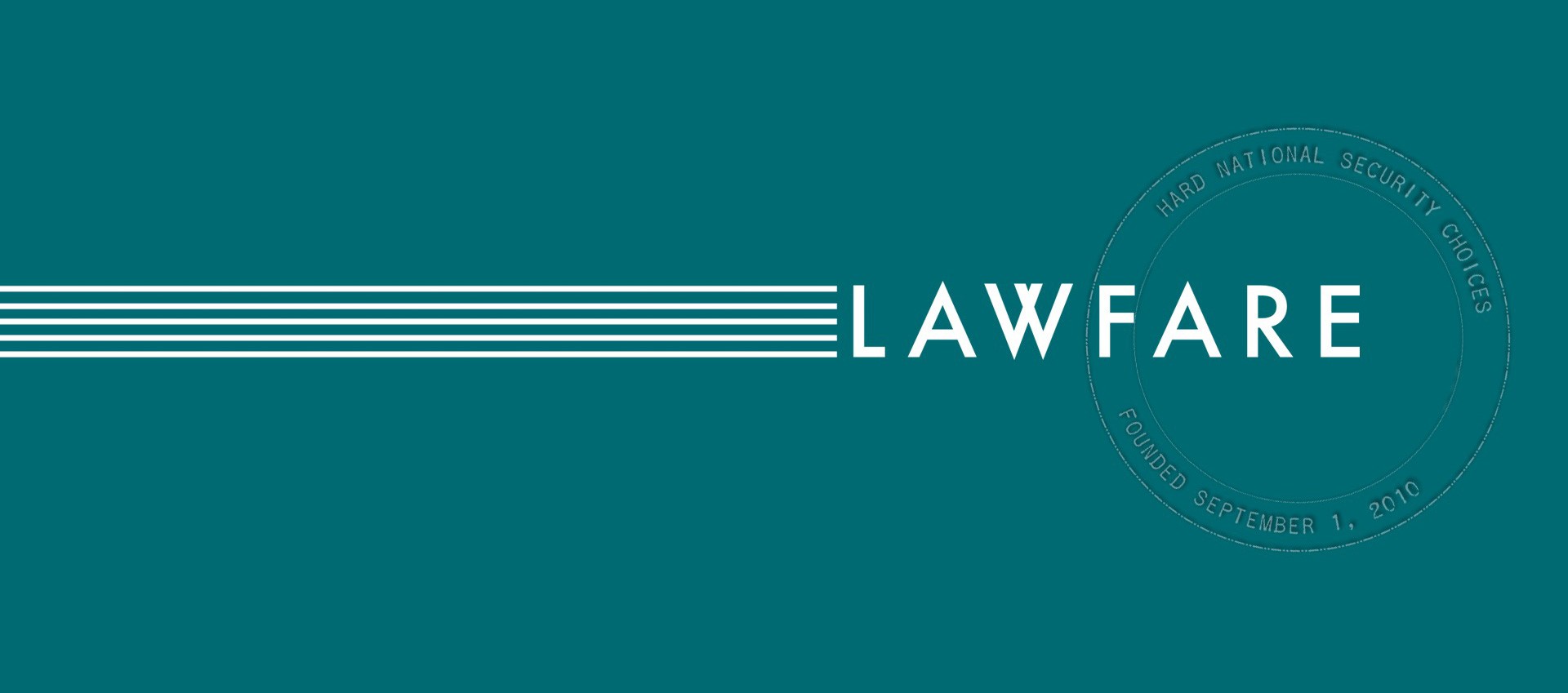The Week That Was: All of Lawfare in One Post

Published by The Lawfare Institute
in Cooperation With

Scott R. Anderson, Matt Gluck, Hyemin Han, Maya Nicholson, Natalie K. Orpett, Roger Parloff, and Benjamin Wittes analyzed the oral arguments at the Supreme Court in the case concerning former President Trump’s disqualification from the presidential primary ballot in Colorado. They detailed the questions the justices asked and what is likely to happen next.
Han, Quinta Jurecic, Tyler McBrien, Orpett, and Parloff evaluated the amicus briefs filed in the Supreme Court case of Trump v. Anderson. They categorized where each amici lands on important interpretation questions of Section 3 and highlighted some notable briefs.
On this week’s episode of “Lawfare Live: Trump’s Trials and Tribulations,” Wittes sat down with Bower, Gerard Magliocca, and Parloff to discuss the oral arguments in Trump v. Anderson, the Supreme Court case on the Colorado Supreme Court's ruling that Trump is disqualified from holding the office of the presidency:
Anna Hickey shared a livestream of the oral arguments that took place at the Supreme Court on Feb. 8 inTrump v. Anderson:
Ian Bassin argued that the Supreme Court’s enforcement of the 14th Amendment against Donald Trump is crucial for upholding democracy and explained how the consequences of not doing so could lead to another constitutional dilemma.
Anna Bower, Anderson, Jurecic, Orpett, and Wittes examined the ruling that was released this morning by the U.S. Court of Appeals for the D.C. Circuit, which determined that former President Donald Trump is not immune from criminal liability for his actions on Jan. 6. They summarized the opinion, discussed its implications, and considered what impact it might have on the progression of the Jan. 6 trial.
Jack Goldsmith argued why the D.C. Circuit’s ruling that former President Donald Trump is not immune from prosecution heightens the case for Supreme Court review of the decision.
Katherine Pompilio shared the U.S. Court of Appeals for the D.C. Circuit’s opinion, which ruled that former President Donald Trump is not immune from prosecution for alleged crimes he committed in office.
On another “Lawfare Live” from this week, Wittes sat down with Jurecic, Anderson, Parloff and Orpett for a live discussion of the D.C. Circuit’s opinion released this morning rejecting former President Trump’s presidential immunity claim:
On the Lawfare Podcast, Wittes sat down with Jurecic, Anderson, Orpett, and Parloff in front of a live audience on YouTube and Riverside to unpack the D.C. Circuit’s ruling that Trump is not immune from prosecution. They discussed the meaning of the ruling, the court’s unanimity in issuing the decision, and what the Supreme Court might do if Trump petitions for review:
Orpett announced Season 2, Episode 3 of The Aftermath: #StormTheCapitol, where she illustrated how social media contributed to the Jan. 6 attack on the U.S. Capitol. With interviews from Jacob Glick and Dean Jackson, Orpett explained how former President Donald Trump and Dan Scavino leveraged social media to their advantage, the failure of social media companies to intervene , and the accountability that has or has yet to take place:
McBrien shared Special Counsel Robert Hur’s report on President Biden’s handling of classified documents after his vice presidency and the reasons behind Hur’s decision not to pursue criminal charges.
On this week’s Rational Security, Anderson, Jurecic, and Alan Rozenshtein discussed this week’s national security news, including the D.C. Circuit’s ruling that former President Donald Trump is eligible for criminal prosecution for crimes committed while in office, the U.S. effort to facilitate a short-term hostage deal and potential long-term security pact with Saudi Arabia for Israel as its military offensive in Gaza continues, and more:
Harout Akdedian examined how the conflict in the Middle East is spilling over into the U.S. through a rise in anti-Jewish and anti-Arab/Muslim violence and hate speech. He discussed the difficulties of addressing the rise in extremism given the protections of the First Amendment.
Gluck shared President Biden’s second letter sent to Congress “consistent with the War Powers Resolution” regarding recent U.S. strikes against Iran-backed militias in Iraq and Syria.
Gluck also shared President Biden’s third letter sent to Congress on Feb. 5 “consistent with the War Powers Resolution” regarding recent U.S. strikes against Iran-backed militias in Iraq and Syria.
Pompilio shared the International Court of Justice’s judgment on preliminary objections in Ukraine v. Russia.
On another episode of the Lawfare Podcast, Wittes spoke with Molly Reynolds and Eric Ciaramella about the congressional intrigue surrounding the situation in Ukraine and the need for congressional action. They talked about how the border and the Ukraine supplemental got wrapped up together, how they're being disaggregated, whether there is a path forward for Ukraine aid after the Senate killed the compromise, and more:
Also on the Lawfare Podcast, Orpett spoke with Fionnuala Ní Aoláin about the legal framework around sexual and gender-based violence, the challenges of prosecuting these acts of violence as international crimes, and where the law fails:
In this week’s Foreign Policy Essay, Doreen Horschig discussed how strengthening the existing nuclear non-proliferation regime could reduce preventative counterproliferation attacks and deter potential proliferator states.
On this week’s Chatter, David Priess sat down with Kristin Surak, whose recent book The Golden Passport takes a multidisciplinary look at global mobility for the wealthy and the complex system that has developed around it. They discussed the new "most powerful passport" rankings, the types of people who seek different citizenship through investment, Turkey's rise as a major Citizenship By Investment (CBI) player, and more:
Lyrissa Lidsky and Christina Koningisor explained how the erosion of Watergrate-era checks on the executive branch and the decline of the institutional press creates an imbalance of power—or “disequilibrium”—between the two entities. They discussed how the law fails to address this disequilibrium, and what Congress can do to remedy the issue.
In the latest edition of the Seriously Risky Business cybersecurity newsletter, Tom Uren discussed how the U.S. Cybersecurity and Infrastructure Agency (CISA) is grappling with the threat of a Chinese cyber actor known as Volt Typhoon, the ongoing cyber “battle” between Ivanti and UTA0178 after CISA issued federal agencies to remove Ivanti products from their networks, and the U.S. government’s visa restrictions on those involved in the misuse of commercial spyware.
On the Lawfare Podcast, Rozenshtein spoke with Riana Pfefferkorn, who published a white paper in Lawfare's ongoing Digital Social Contract paper series exploring the legal and policy implications of CG-CSAM. Also joining the discussion was her colleague David Thiel, co-author of an important technical analysis of the recent increase in CG-CSAM:
In the latest paper for Lawfare’s Digital Social Contract series, Pfefferkorn discussed the the current legal and policy implications of computer-generated child pornography and other child sexual abuse material, or CG-CSAM, and offered policy recommendations to address existing issues.
And Scott J. Shackelford, Craig Jackson, Scott Russell, Emily K. Adams, Anna Boustead, and Christos Makridos discussed, through their survey findings, the need for an empirical approach to establishing security-by-design.
And that was the week that was.



